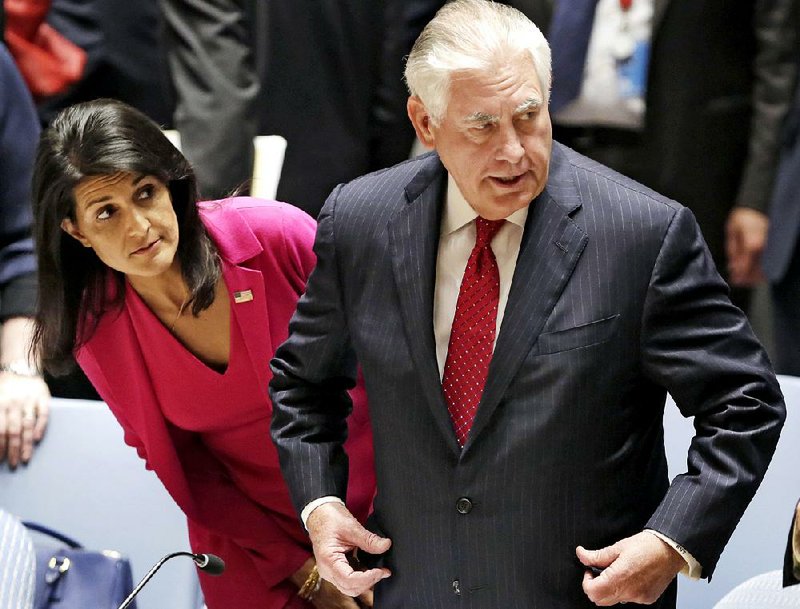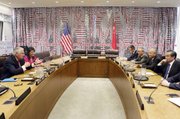UNITED NATIONS -- Secretary of State Rex Tillerson called Friday for new economic sanctions on North Korea and other "painful" measures over its nuclear-weapons program, as the Trump administration warned that it would take military action if diplomacy fails.
RELATED ARTICLE
http://www.arkansas…">S. Korea: Won't redo U.S. trade deal
"Failing to act now on the most pressing security issue in the world may bring catastrophic consequences," Tillerson said during a special session of the United Nations Security Council that was called to review what President Donald Trump's administration calls its most dire national security concern. "The more we bide our time, the sooner we will run out of it."
Tillerson's push at the U.N. came just before North Korea test-fired a midrange ballistic missile from the western part of its country in what would have been there the early-morning hours of today. South Korea and the United States said the launch apparently failed.
The Trump administration said it is willing to bargain directly with North Korea over ending its nuclear-weapons program but under strict conditions that make talks unlikely anytime soon.
[PRESIDENT TRUMP: Timeline, appointments, executive orders + guide to actions in first 100 days]
Ahead of the diplomatic effort at the United Nations, Trump said direct conflict is possible.
"There is a chance that we could end up having a major, major conflict with North Korea. Absolutely," Trump told Reuters in an interview this week. "We'd love to solve things diplomatically, but it's very difficult."
In the most detailed explanation to date of the new Trump administration's emerging policy for dealing with North Korea, Tillerson said U.S. urgency is driven by the current nuclear threat to allies South Korea and Japan as well as the likelihood that North Korea will soon be able to strike the United States.
"All options for responding to future provocation must remain on the table. Diplomatic and financial levers of power will be backed up by a willingness to counteract North Korean aggression with military action if necessary," Tillerson said.
"We much prefer a negotiated solution to this problem," he added. "But we are committed to defending ourselves and our allies against North Korean aggression."
At issue is North Korea's simultaneous effort to perfect a nuclear warhead that could be delivered far from its shores and develop missiles with a range long enough to be a threat to the United States. North Korea already possesses missiles able to threaten U.S. allies South Korea and Japan, as well as other Asian neighbors.
Regarding the latest test by the North, South Korea's Joint Chiefs of Staff said in a statement early this morning that the missile flew for several minutes and reached a maximum height of 44 miles before it apparently failed.
It didn't immediately provide an estimate on how far the missile flew, but a U.S. official, speaking on condition of anonymity to discuss sensitive matters, said it was likely a medium-range KN-17 ballistic missile. It broke up a couple minutes after the launch, and the pieces fell into the Sea of Japan.
Japan's Chief Cabinet Secretary Yoshihide Suga, speaking after a meeting of Japan's National Security Council, said this morning's missile is believed to have traveled about 30 miles and fallen on an inland part of North Korea.
Trump did not answer reporters' questions about the missile launch as he entered the White House after he returned from a day trip to Atlanta. Shortly afterward, spokesman Sean Spicer said the White House was aware of the launch and Trump had been briefed on it.
Trump later posted on Twitter, "North Korea disrespected the wishes of China & its highly respected President when it launched, though unsuccessfully, a missile today. Bad!"
Trump has said he is counting on Chinese President Xi Jinping to encourage North Korea to give up its pursuit of ballistic-missile and nuclear-weapons programs. Trump has also said he thinks Xi will do the right thing. China is North Korea's staunchest ally.
But Trump has also threatened to go it alone if Xi fails to deliver.
North Korea didn't immediately comment on the launch, though its state media today reiterated the country's goal of being able to strike the continental U.S.
Nations Admonished
Tillerson, the top U.S. diplomat, said new economic penalties should come on top of scrupulous enforcement of existing sanctions, and he was bluntly critical of nations that look the other way at North Korean efforts to evade the heavy yoke of sanctions the Security Council has already applied.
He asked for a halt to North Korean imports, especially coal, and an end to a guest-worker program that provides cheap labor. Tillerson also asked other countries to suspend or downgrade diplomatic relations with the communist nation, alleging that the regime of Kim Jong Un abuses diplomatic privileges to support illicit missile and nuclear programs.
Tillerson said North Korea is unlikely to give up its weapons or change its bellicose behavior under current sanctions and diplomatic condemnations. He said new economic penalties are necessary, as well as more vigorous enforcement of existing sanctions that he said North Korea has found ways to evade.
"I urge this council to act before North Korea does," Tillerson said. "We must work together to adopt a new approach and impose increased diplomatic and economic pressure on the North Korean regime."
Referring to North Korean ally China, Tillerson said nations that help North Korea evade sanctions "discredit this body."
Tillerson noted that China accounts for 90 percent of North Korean trade, giving it unique economic leverage.
He said the United States and China have had productive discussions about North Korea, and the new U.S. willingness to negotiate with North Korea is partly in deference to China's long insistence that the only way to lessen tension is through direct talks.
"The United States also would much prefer countries and people in question own up to their lapses and correct their behavior themselves, but we will not hesitate to sanction third-country entities and individuals" that help North Korea go around sanctions, Tillerson said.
China's Position
Although the council did not vote on new sanctions or other measures Friday, the Trump administration hoped for a show of force with the entire council, including China, Russia and the U.S., coming together to air concerns about North Korea's behavior.
Chinese Foreign Minister Wang Yi told the council that diplomacy is not hopeless, and he said China cannot be expected to rein in North Korea on its own.
"The state of affairs on the Korean Peninsula is not caused by any single party, nor is it reasonable to ask any party to take sole responsibility," Wang said via an interpreter.
"We call upon all parties, especially those directly concerned -- DPRK and the U.S. -- to demonstrate sincerity for dialogue and restart dialogue," Wang said, using an acronym for North Korea's formal name. "China will be open to all useful proposals from the parties."
U.N. Secretary-General Antonio Guterres, who joined Tillerson and foreign ministers from countries that sit on the decision-making council, condemned what he called North Korea's repeated violations of the body's resolutions over nuclear and missile testing and development.
"I am alarmed by the risk of a military escalation in the region, including by miscalculation or misunderstanding," Guterres said.
The Security Council session Friday comes at a particularly tense time in relations between North Korea and the United States, with the Trump administration sending warships to the region in a show of force against Kim's regime.
This week, North Korea conducted large-scale artillery drills, showing off conventional weaponry that can easily reach South Korea's capital, Seoul, the center of a metropolitan region that is home to about 25 million people.
A North Korean propaganda outlet released a video clip on Thursday showing a simulated attack on the White House and declaring that ability to destroy the United States "is in our sights."
"North Korea must understand that respect will never follow recklessness," Tillerson said Friday. "North Korea must take concrete steps to reduce the threat that its illegal weapons programs pose to the United States and our allies before we can consider talks."
The last round of direct talks, initiated in 2003 and involving the United States, China and other nations, produced no rollback of the North Korean program. Last month, during his first trip to South Korea, Japan and China, Tillerson declared that the "era of strategic patience" that included those talks was over and that "all options" were now on the table.
China supports talks and has long argued that although it also wants to rid North Korea of nuclear weapons, it cannot persuade North Korea to give them up without direct assurances from the United States.
Tillerson offered some Friday, telling the council that the United States is not seeking "regime change" to topple the Kim family dynasty.
Information for this article was contributed by Anne Gearan of The Washington Post; by Foster Klug of The Associated Press; and by Gerry Mullany, Gerry Doyle and Choe Sang-Hun of The New York Times.
A Section on 04/29/2017


